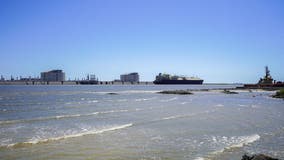North American bats 'at risk of severe population decline' from climate change, disease: report
Scientists say many North American bats are in trouble.
Rare hybrid solar eclipse to dazzle skywatchers on Thursday
There are four types of solar eclipses -- and the hybrid solar eclipse is the rarest of them all.
Landmark law saved whales through marine industry changes, scientists say
The drive to protect vanishing whales has brought impacts to marine industries and those changes are accelerating as the Endangered Species Act approaches its 50th anniversary.
How sulfate causes air in Texas' Gulf of Mexico coast to be more polluted
Researchers at the University of Houston claim shipping emissions, humidity, and strong sea breeze also contribute to the hazy conditions.
Norfolk Southern train cars derail, spilling diesel and oil; 2 taken to hospital
Two Norfolk crew members were briefly hospitalized after the crash.
Deadliest volcano in Western Hemisphere shows signs of increased activity
An eruption in 1985 caused the deaths of more than 25,000 people.
Scientists find ‘mountains,’ variable structures near Earth’s core
Samantha Hansen, a lead researcher, said the team was surprised by how “abundant” the structures were, finding evidence all over the southern hemisphere.
Here's what really happens to your used clothing donations
Overall, only about 15% of used clothes and other textile waste is recycled in the U.S., according to EPA data. Here’s how to make sure your old clothes have the best impact.
Here's why there could be pink snow at Yellowstone this summer
Visitors can see a variety of colorful snow patches, including pink, green, orange, and brown at different areas of Yellowstone Park this summer.
Hawaii considers tourist fees to help protect its natural environment
“All I want to do, honestly, is to make travelers accountable and have the capacity to help pay for the impact that they have," one Hawaii lawmaker said.
Houston ranked among top 15 best cities for urban gardening
Houston is known for a lot of things, and now we can rack up gardening among them.
Gas prices could hit $4 a gallon after OPEC production cut
As of Monday, regular gasoline averaged roughly $3.50, according to AAA. If Flynn's prediction holds, it could mean gasoline prices will climb above $4 per gallon as summer nears.
Saudis, others cutting oil production could spike prices worldwide
Higher oil prices would help fill Russian President Vladimir Putin's coffers as his country wages war on Ukraine and force Americans and others to pay even more at the pump amid worlwide inflation.
Plants can make noises when under stress, study says
Researchers said when plants were dehydrated or cut, the sounds emitted were louder than when they were left alone.
US lawsuit seeks to protect endangered coral reef species
An environmental organization is suing the U.S. government and accusing it of failing to protect 12 endangered coral species across the Caribbean and the Pacific Ocean that have been decimated by warming waters, pollution and overfishing.
Evidence of PFAS, ‘forever chemicals,’ found in toilet paper, study says
PFAS don’t degrade in the environment and are linked to a broad range of health issues, including low birthweight and kidney cancer.
'Climate time bomb is ticking': UN report warns world running out of time to reverse effects of climate change
The rate of temperature rises in the last 50 years is the highest in 2,000 years, and concentrations of carbon dioxide are the highest in at least 2 million years.
Minnesota nuclear plant leak didn’t require public notice: Regulators
Minnesota regulators knew four months ago that radioactive waste had leaked from a nuclear power plant in Monticello — but they didn’t announce anything about the leak until this week.
Waze adds feature for EV drivers to find compatible charging stations
Users will now be able to enter their electric vehicle and plug type into the Waze app to find relevant charging stations along their route.
EPA to limit toxic ‘forever chemicals’ in drinking water
The EPA proposed limiting the amount of harmful “forever chemicals" in drinking water to the lowest level that tests can detect, a long-awaited protection the agency said will save thousands of lives and prevent serious illnesses, including cancer.





















